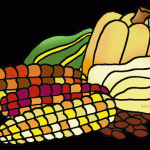 The holidays are upon us once again, the season of family, of gatherings, of traditions. The season, in most people’s lives, of hope.
The holidays are upon us once again, the season of family, of gatherings, of traditions. The season, in most people’s lives, of hope.
Our tradition at Thanksgiving had been for many years to head to a lodge in the country with my mother’s family; aunts, uncles, cousins, nieces and nephews would converge and catch up and try to store up enough memories to last for the coming year. One year, however, a favorite aunt was no longer there, and the tradition gradually died with her. It simply wasn’t the same without her, and so things changed.
The last couple years we’ve begun a new tradition in my family. We all — my husband and children, my parents, my siblings and their families — travel to the Catskills to spend Thanksgiving at my brother’s mountain cabin. It is becoming for our children what the lodge in the country was for my siblings and me.
Bullying, some would argue, is also a tradition. It’s been happening for generations, and is often even passed down within families. The weapons change through the years, but the victims tend to remain constant — kids who are different. Boys who are effeminate, girls who are tough. Kids who are smart, or nerdy, or geeks, or Goth, or fringe. Or whatever the disparaging name is for “different” at the time.
Hair was yanked, shorts were pulled down, rumors were spread, lies were told. Kids were scorned or physically shoved or pushed or punched. Kids can be cruel; we all know that. They know exactly how to humiliate other kids. They know how to cut so that no blood shows.
In the old days, bullying was ignored, or worse, accepted as a rite of passage. People either didn’t recognize or didn’t admit it, and so a blind eye was turned. And the kids who were getting bullied were afraid to tell, because the usual result was simply more bullying . . . except intensified.
So traditionally, not much was done.
Since school began this year there have been too many suicides nationally as a result of bullying, of kids being ostracized, in many cases, for being gay. Some were as young as 13. That’s middle school. My son is in middle school. I hate the fact that the relevance to my immediate life is finally what made this unacceptable to me, but regardless, it has.
And setting aside for a moment the deeper issues, including the fact that being gay can still be such a source of shame that death would be a viable alternative, it’s time to acknowledge that the weapons of bullying have become too dangerous, particularly in the hands of children. We can no longer reassure with “This too will pass,” when we know it won’t. When someone’s humiliation is posted online, or when the harassment continues the moment his computer is turned on, it’s really a false promise.
Bullying has to stop now. It can no longer be ignored, or addressed simply with posters in the hallway. The guidelines must be stricter, the punishments stronger, and the rules enforced. Somehow — and I don’t have many answers here, I’m afraid — somehow we have to make it such that the bullying does not get worse when the bully is called out. It’s understandable why many kids keep the situation to themselves, but that doesn’t mean it can’t be changed. When we do that, it will be easier for other kids to step up and defend their classmates, to show the bullies that they are not cool and not funny and not tolerated.
And parents need to open their eyes. If their child is being bullied, they need to know how to get involved, who to call, what to say. If their child is the bully, they need to know the same things. In this era of technology, when anything a child says or does — or anything that is said or done to him — can be posted on the internet in perpetuity, parental involvement should be a priority, not an afterthought. The fact that our kids often know more about technology than we do does not mean they’ve grown up faster, and it certainly does not negate our responsibility to parent them.
Our Thanksgiving tradition evolved because of the loss of someone we loved so much that it hurt to do it without her. We should all be hurting over what’s happened to these children, and all of the others who have felt pain and humiliation at the hands of other kids. This tradition must change.
And maybe now, this season of hope, is the time.
Maggie Lamond Simone is a national award-winning columnist and author. Her books include “From Beer to Maternity,” a USA Book News Finalist for humor, and “POSTED! Parenting, Pets and Menopause, One Status Update At A Time.” Her essays are included in “P.S. What I Didn’t Say” (2009), multiple “Chicken Soup for the Soul” editions, Cosmopolitan magazine, and Notebook: Magazine (Australia). She is a professor of journalism and public speaking at SUNY Oswego, Oswego, N.Y., a monthly columnist for Family Times in Syracuse, N.Y., and a blogger for The Huffington Post.
